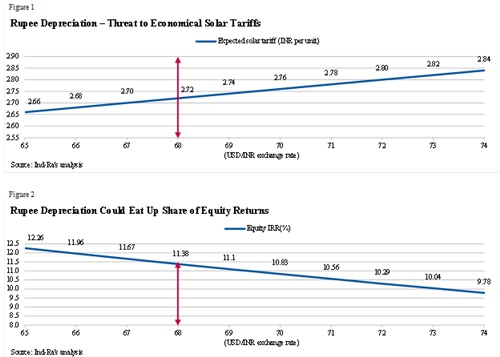The depreciating rupee, if unhedged, will impact investor returns in bid solar power projects in the event of a significant exchange rate variation between the time of bidding (bid assumptions) and finalisation of module supply agreement, said India Ratings and Research (Ind-Ra).
The exchange rate deteriorated 5 per cent yoy in May 2018, when the bids were hovering around Rs2.5 per unit.
However, post module supply agreements, the developer may opt to hedge the exchange rate risk evaluating the costs involved. As per the rating agency’s calculations, an Rs1 increase in the dollar-rupee exchange rate leads to a 2 paisa per unit increase in tariff.
For instance, if the rupee depreciates to Rs67 from Rs65 between the time of tariff bidding and finalisation of terms of payment for module supply, which can easily take six to eight months, the solar power developer will suffer an overall 4 paisa / unit reduction in margin, which is significant considering the modest margins for these developers.
The ministry of new and renewable energy awarded about 10.5GW of capacity to solar power developers in FY18, when the rupee hovered around Rs64-65 per dollar. The rupee has now depreciated to Rs67-68 per dollar. India imports about 90 per cent of its solar module requirements.
Based on the sample set of Ind-Ra-rated solar projects, solar modules account nearly 60 per cent of the solar project cost. As per Ind-Ra’s portfolio, most of the projects generally do not hedge the rupee, given the short time frame between negotiation and delivery period.
The study is based on the premise that solar power developers will pass on the full impact of increase in project cost, arising from rupee depreciation to the consumer.
The recent round of auctions conducted by NTPC Limited for 750MW of solar power has witnessed winning tariffs of Rs2.72 per unit-2.73 per unit. As per Ind-Ra’s analysis, if rupee depreciates to Rs72 from the current around Rs68, the solar power developer will incur a loss of about 8 paisa per unit until the actual payments, as currency fluctuation is not covered by the procurer under ‘Change in Law’ or any other clauses under the power purchase agreement (PPA).
Solar power developers may also opt for reducing direct current to alternating current overloading ratio due to increased module costs, thereby negatively impacting the project’s generation performance. Also, any sharp fall in rupee could lead to delays in project execution, if the solar power developer opts to renegotiate the module supply contracts to keep the costs at same levels as assumed for financial closure.
The trend of decline in USD rates of solar panels and modules is reversing and depreciating rupee could be another hindrance to cheaper solar tariffs in India. The rupee has depreciated around 7% since the beginning of 2018 until date.
On 2 April 2018, the ministry of new and renewable energy issued a clarification to guidelines for tariff-based competitive bidding for procurement of power from grid connected solar photo-voltaic power projects.
To bring further clarity, duties and cesses were added in the scope of ‘Change in Law’ clause as per model PPA, apart from revising the tax rates. This move brings clarity to bidders and they will be compensated for any import/safeguard duty/cess (excluding corporate tax) applicable post the bidding date. However, the winning bidder still remains exposed to the risk of inflation in project costs due to fluctuating currency rates, as revenue under PPA is derived in INR, whereas a major chunk of the project cost is incurred in USD.



















